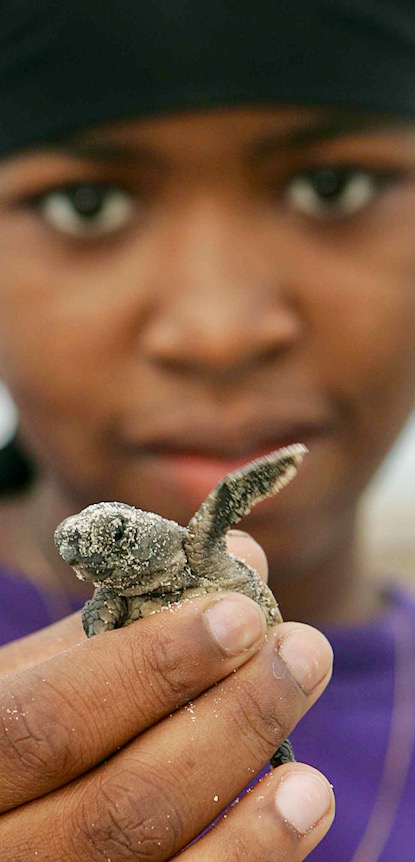
BABY LOGGERHEAD TURTLES along the Atlantic shore in North Carolina. Photo courtesy of the U.S. Geological Survey on FLICKR.
.
Let’s Learn from the Turtles.
EDITOR’s NOTE: Each month, veteran journalist Martin Davis contributes a column to our magazine from the perspective of the millions of Americans who answer pollsters’ questions about religious affiliation with the option: “None.” Research shows that this growing portion of our population is diverse and includes many men and women with vibrant spiritual lives. Martin’s columns have varied from baseball to the Marines to memories of JFK. Few writers, today, are exploring this realm as thoughtfully as Martin. And, we keep hearing from our readers that many are looking for such compassionate companions on this journey. Collectively, we need this kind of writing. Please, if you enjoy Martin’s column this month, share it with friends via social media, email or simply print out this column and pass it along.
Here is Martin’s latest …
.
By MARTIN DAVIS
Contributing Columnist

A NEW KIND OF CONGREGATION ALONG THE SHORE: Men, women and children are drawn to these sands to watch, encourage and help a timeless—and now endangered—migration. (WANT TO KNOW MORE? Clicking on this photo will take you to the website of the global SEE Turtles nonprofit.)
The beaches along North Carolina’s southernmost coastline play host to one of the world’s great natural shows each summer. If you’re there in June or July, walk down to the beach about an hour before sunset. Look for the crowd of people forming a line from the dunes to the ocean.
You’ll find that the crowd is separated by two lines drawn in the sand, compliments of local volunteers charged with ensuring that the baby sea turtles who emerge from their nests along the dunes this time of year enjoy safe passage to the sea. I caught one such performance on my vacation to Ocean Isle, NC, this summer.
Two things about the event stood out.
The first are the turtles themselves. That they know to hatch at dusk, and that they know how to make their way straight to the ocean, is a marvel that ignites the imagination. (The turtles are also cute, but that’s for another day.)
The second are the people who are there to cheer them on. It is exceedingly rare anymore to see people bonded by something that transcends politics, religion, race, whatever. We’re so busy tearing at each others’ throats that we’ve forgotten what it means to work together. Yet, these turtles bond us—to one another and to the greater world that we all share.
Three Keys to Our Movement
I began writing these monthly columns nearly a year ago as a simple way to let folks understand more about people like me—people who have dared to walk away from organized religion and pursue (or not pursue) a life of spirituality on different terms. Through these stories and reflections, hopefully you have a glimpse into the many ways we view the world.
When we began this monthly series, there were no grand plans or thoughts about where it might go. Just an experiment, really, to see if anyone would even care. The response has proven a pleasant surprise to me. Editor David Crumm has encouraged me to build on the good feedback we have received by expanding on the experience of people who live outside traditional congregational life. He has challenged me to write about our values. I’ve pondered this request for some time, and was honestly ready to tell him I couldn’t.
The turtles changed all that.
To understand how, it helps to back up just a bit and ask what has given rise to the numbers of people walking away from organized religion. Once this becomes clear, you can then better understand how the experience of watching baby turtles walk to the sea has brought some clarity to my thinking about who we—the religiously unaffiliated—are, and what values we live by.
So why are people leaving organized religion? I’d like to offer up three reasons—questioning teachings, frustration with the organization, and religion’s weakening hold over society.
This list is far from authoritative, and it most certainly does an injustice to a group as large and diverse as those who are religiously unaffiliated. This short list does, however, capture a good chunk of what pollsters have been seeing for years. And they reflect well why I have moved in this direction.
Key 1: Questioning Religious Teachings
In 2018, Pew dipped into its rich surveys to find out why people are religiously unaffiliated. A number of answers came forward, but the most popular was that people fundamentally question religious teachings. The survey itself doesn’t go into the specifics of the questions people are asking about church doctrine and governance, but I can venture some guesses based on my own experiences.
As one who originally set out to become a minister, I learned very quickly that religious organizations are not particularly interested in challenges to their teachings. Raised a Southern Baptist, one of the first tenets of my faith that I challenged was the notion that Christianity itself offered the one path to truth. The questions grew out of a lifetime of reading, meeting people from different cultures and traditions, and closely reading the sources of the Christian faith itself. Over time it became clear to me that not only is Christianity not the sole harbinger of truth, but that it’s difficult to even make the argument that those who were around the first couple of hundred years believed this themselves.
As I began raising this specter, I quickly learned how inhospitable religious organizations can be.
The irony, of course, is that religious communities are precisely the places where we should be raising such questions. Even as I’ve moved out of houses of worship, I’ve not stopped reaching out to religious leaders with whom I’ve remained friends about working within their communities to talk about some basic teachings, and to offer some alternative views. I’m still waiting for someone to accept the offer.
This anxiety with questions isn’t limited to the more traditionalist branches. Readers of this publication are probably not surprised to hear that conservative religious groups aren’t particularly open to hearing from pluralists. But it’s equally true that more-progressive traditions also can be painful places for people who question the teachings of these movements.
Key 2: The Institution and Hypocrisy

SO MANY OBSTACLES! A baby faces the challenges along the shore. Photo via Wikimedia Commons and USFWS Becky Skiba.
Sojourners recently asked an important question: “White Evangelicals Have Won Political Influence, but at What Cost?” It reaches a conclusion that many people outside of religious communities are asking: How can churches so actively stand against immigrants, when Christianity’s scriptures clearly call people of faith to welcome them?
Likewise, the Catholic sex-abuse scandal has sent many people fleeing Catholicism, and kept others from participating. And why not? We now have more than two decades of headlines about sexual abuse coming to light—with little sign that Catholic leaders have decided to do much about the root causes of these patterns, especially the coverups, within their secretive hierarchy.
These are just two examples of the many hypocritical positions that have become obvious in recent years. Many, many more could be documented. It’s not true, of course, that religious organizations are the only ones who are hypocritical. Government, businesses, social groups and even individuals all display hypocrisy to one level or another. But only religious organizations couple hypocrisy with a claim to moral supremacy and the right to place an existential pressure on them to fall in line.
So long as religious organizations continue to claim the high ground, right-thinking people are going to continue to shy away from these groups when their hypocrisies are exposed.
Key 3: Losing Control
As the nation heaves under a resurgence of religious fundamentalism and explicit campaigns to create an American theocracy, it’s easy to forget that we are more likely seeing the dying gasps of a society that holds religion as central to the social fabric. There are many sources for this idea, but I recommend you begin with these short articles, starting with historian and journalist Jon Meacham in Newsweek, then The National Catholic Reporter and Psychology Today.
Historically, one can point to many moments that mark the beginning of America’s effort to marginalize religion, but I think George Marsden in his biography of Jonathan Edwards explains it best. The country was locked in a great intellectual struggle in the years leading up to the Constitution, with the science and rationalism of Ben Franklin locked in a wrestling match with the conservative religious dogma of Jonathan Edwards. Simply said, Franklin won.
Ever since then, science and reason have continued to chip away at religion as a viable organizing force in society. The works of Charles Darwin chipped away at the idea that there is a god, and that we are created by that god, and that religious organizations serve as the intermediary between god and his creation. Space travel that started in the late 1950s and continues unabated has chipped away at the idea that humans are unique. Increasingly, it looks to be just a matter of time before we discover life elsewhere. Most Americans, already accept this.
Most recently, the advent of the internet has made it increasingly difficult for people to accept the idea that any one religious group alone has access to “truth,” which in turn undermines organized religion’s ability to exercise control over society.
Backlash notwithstanding, the demographics here are clear. Organized religion’s grip on America is loosening. And it’s hard to imagine that religion will gain the upper hand anytime in the near future.
Back to the Turtles
These changes in the role of faith in people’s lives are nothing short of earth shattering. Until the mid-19th century, few people questioned the idea that a god actually created the world. Today, most people rightly reject the notion of Creationism outright.
As Americans continue to press to expand the promise of individual freedom to all peoples, the ability of religious organizations to control moral discussions in the country fades. Especially when nearly half of people who are active in a faith tradition (US Catholics and evangelicals) are still largely denying women leadership roles. These positions undercut religious organizations’ authority.
As the organizations crumble, the nation’s shared values have also undergone an upheaval. And those who no longer attend church or recognize its authority are the ones trying to discover the values and morals that will unite us moving forward.
This brings me back to the turtles.
Religion has long been the backing that holds the fabric of society together because belief in god was nearly ubiquitous. With that belief eroding, the same fabric that brings people together to cheer on baby turtles is the one that is uniting people who no longer participate in religious organizations.
These ideals, or values, can succinctly be named:
- Belief in transcendence
- Mutual respect born of the realization that humans are not the pinnacle of life
- Humility
- Love
 Over the next four months, I hope to explore these values in more depth. We can think of each as one of the values that serves to bind people across a range of belief systems—and connects us. And when we are attuned to these values, we collectively come together to celebrate and marvel at the mysteries of life we all share. In short, embracing these values grants you to one of the best seats at the beach, watching with others the wonder of life that is unfolding and reaching and climbing all around us.
Over the next four months, I hope to explore these values in more depth. We can think of each as one of the values that serves to bind people across a range of belief systems—and connects us. And when we are attuned to these values, we collectively come together to celebrate and marvel at the mysteries of life we all share. In short, embracing these values grants you to one of the best seats at the beach, watching with others the wonder of life that is unfolding and reaching and climbing all around us.
In the Spirit of the Sea Turtles
This list is aspirational. These are ideals I have come to believe that the religiously unaffiliated need to embrace to guard against the extremes that an organized-religion-free understanding of life can generate. Narcissism on one end of the spectrum, and hedonism on the other. It’s also a list born of a lifetime of living in, among, and around people of faith and non-faith; church-goers and church-rejecters.
Most important, however, this is a list that does not advocate for the destruction of religious traditions in favor of something new. Rather, it’s an invitation for religious organizations to learn from what those who have left their doors have to teach them. An invitation to join with those living outside organized religion to reach a higher level of understanding. And it’s an invitation to the religiously unaffiliated to see in people within religious institutions a kindred spirit, interested in the same questions as us.
In the spirit of the sea turtles—I invite you to walk with me.


I concur and have been part of a group in Estero, Florida who are actively following this “progressive” thinking. We read, meet and discuss ideas and above are are open to expanded thinking. I think it fair to say that we are all spiritual. The name mystics helps label your thinking although I hate the use of the word label, it is too confining. Keep up your work and outreach. The sea turtle anologybis a great one. I have seen these marvelous creatures in SW Florida where the hatchlings here are just beginning to emerge and seek their perilous tripmtomthe gulf.